Displaying items by tag: PierFrancesco Favini
Count of Monte Cristo/ 2025
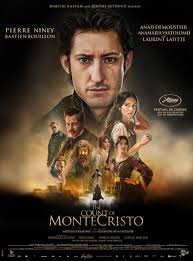
THE COUNT OF MONTE CRISTO
France, 2024, 178 minutes, Colour.
Pierre Niney, Bastien Bouillon, Anais Demoustier, Anamaria Vartolomei, Laurent Lafitte, Pierfrancesco Favino, Patrick Mille, Vasdsili Schneider, Julien De Saint Jean, Julie De Bona, Adele Simphal, Stephane Varupenne, Marie Narbonne, Bruno Raffaelli.
Directed by Alexandre de La Patellière, Matthieu Delaporte.
The novels of Alexandre Dumas have been very popular since the 1840s. French history – The Three Musketeers, the Man in the Iron Mask, The Count of Monte Cristo. And, they have provided a great deal of entertainment on the big screen and on the small screen. The Wikipedia entry on the novel lists 25 film versions all films, even in imaginary sequels, which derive from the plot and even more television versions.
The novel gets full attention in this version. It runs for almost 3 hours. And, it can be described as “lavishly-mounted” which covers the visual style of settings and sets, costumes and decor, 19th century atmosphere. And, this time, it is a French version, a national version of a national treasure.
Audiences remembering previous versions, this reviewer remembering Robert Donat, Richard Chamberlain, Jim Caviezel, the injustices that fall on the central hero, Edmund Dantes, especially, his imprisonment on the island, Chateau D’If, near Marseille. The long years that he spent isolated in prison, the tunnelling, his contact with Abbe, Faria the Abbe instructing him, bequeathing him the treasures of Monte Cristo, but no abating the sense of vengeance and revenge. And, then, his escape.
This time Edmond Dantes is played by French actor, Pierre Niney, who has been building a successful career in a variety of roles but who now successfully embodies the complexities of the Count of Monte Cristo. Interestingly, the role of the Abbe Faria is played by very popular Italian actor, Pierfrancesco Favino, most convincing in this role.
However, in this version, all this action takes place in the first hour. It was something of a surprise to find two hours spent on Edmond Dantes and his voyage to Monte Cristo, the treasure, his new identity, his place in the world and the response to this mystery celebrity. Even though the film is long, a lot of the action takes place off screen, the screenplay suddenly moving five years or more in advance, the audience having to fill in their response to the changes in the Count.
But, for the drama, his establishing himself, the long quest for revenge, his activities in the meantime, his international travels, his contacts, there is a huge supporting cast. There is the opening sequence of his rescue of the Napoleonic spy from the sea, his humble family background, the accusations against him, the betrayals. And these characters, years older, quite complex stories in their own right, become the targets of his plotting, manipulations, violent revenge, impoverishment of rivals, deaths.
And, as with the other versions, there are some swashbuckling sequences and swordfights. But, ultimately, the novel and the film versions do raise the perennial and important question from the Gospels, “what does it profit to gain the whole world but to lose one’s soul?”.
- The long popularity of the novel, the historical novels of Alexandre Dumas? The many film versions, television series, imaginative sequels, stories based on the plot – especially unjust imprisonment, escapes, vengeance?
- A lavish 21st-century production? Period, atmosphere, costumes and decor, buildings, mansions, interiors? Courts, jails, the Château d’If? Sequences at sea? The rescue? The isle of Monte Cristo? The treasures?
- The length of the film, audience emersion in the period, the characters and issues?
- The opening, the sea and the ships, in the sea, Dantes and his rescuing of the young woman, the reaction of the Captain, his anger? Meeting with the company owner, his dismissal of the captain, his promotion of Dantes, the identity of the woman, Napoleonic spy?
- Dantes, return home, reunion with his father, his father as a servant (and the later grief at the news of his father’s death), the aristocratic family, the conversation, his love for Mercedes, the friendship with Fernand? The wedding, the interruption, his being arrested, Mercedes lived at the altar?
- The interrogation, the role of the hill fort, the ship’s captain, the owner of the shipping company, Fernand, Danglars and his associate, listening in, Fernand giving up Dantes for the family’s name? Dantes taken away, the imprisonment?
- Four years passing, Dantes alone in his cell, the grating at the top, the roll call for “Living”? His suffering, the appearance? Stone moving, the contact with Abbe Faria? The tunnelling continuing, the discussions, Faria offering to teach Dantes everything, languages, maths, philosophy, history? 10 more years passing, the tunnelling, the saltwater, the collapse, the injuries to Faria, and his explanation of the Knights Templar, the treasures, the island of Monte Cristo? Faria dying, the preparations for his body to be thrown overboard? Dantes, substituting himself, the discovery of the empty cell, his being thrown into the sea, escaping from the canvas, swimming to safety?
- Monte Cristo, the steps, the mausoleum, opening it, the dark and the torch, the vast depths, the discovery of the treasure?
- The screenplay and the passing of time, months, years? The later dialogue filling in what happened to Dantes, his emergence as the Count of Monte Cristo? His buying the mansions, the setup and decor, affluence? His identity? (And his disguising himself as a priest and confronting Danglars’ associate, getting the truth from him, later appearing, to get absolution, and leading his band of thugs?)
- Dantes and his personality, the past experience, the imprisonment, his travels, and the news that Mercedes had married Fernand? A son? His bitterness, wanting vengeance, coldly calculating and planning?
- His finding the woman he rescued, her story about her brother, his mistress pregnant, the birth, de Villefort burying the baby, her rescuing it, bringing him up, going to the institution? Dantes and his visit, meeting Andre, taking him away, the years passing, his educating him, part of his plan? The revelation Andre about his father?
- Haydee, her story, the war, Dantes finding her, her father, the role of Fernand, losing his eye, but killing her father, her being part of Dantes’s plan?
- The stage robbery, Andre, being pursued by Albert, the thugs, Dantes and the rescue of the boy, restoring him to his family, their gratitude? And the assailants all getting up after their performance?
- Meeting Fernand, meeting Mercedes, his reaction, judging her for not waiting? Her suspicions of his identity? Their further meetings, tactics and wordplay? Ultimately, the revelation of the truth, her knowing who he was, her pleading for her son, her story about his loving him, his producing the document of Fernand’s betrayal?
- Danglar5s, his prosperity, fleet, slavery, organised human trafficking in Marseilles, his involvement, his marrying de Villefort’s mistress, their daughter? His self-confidence?
- The various socials, entertaining, Dantes and his being feted? The story of Lord Halifax, ultimately Dantes masking himself, literally, as Halifax, the interview with de Villefort? His psychological manoeuvres? The newspaper, Impartial, and the stories of Danglars’ fleet and disappearance, the reassurance, Danglars and his finance, confident of putting all his hopes in Dantes’s money?
- The romances, Albert and Haydee, Dantes forbidding it, yet their meeting, the romance? Andre, and his attentions to Danglars. daughter, and the fact that she was his half sister?
- Dinner, at the Château where Andre was born and buried? Dantes and his way of telling the story, the guests listening, and Danglars interested, the threat to de Villefort?
- In court, Andre and his previous masquerade as the Spanish count, credibility, rehearsing his lines with Dantes? Exposing the truth, the exposure of his father? And his later arrest? Danglars and the realisation of the truth, Dantes and his self-revelation?
- Albert, his love for Haydee, her love for him, urging him to go? Defying Dantes, the glove, the duel? Mercedes and her pleading for her son? The duel, Dantes shooting away? His return, Haydee and her upset, denouncing him, her love for Albert, his being in the coach, emerging, Dantes urging them to run away to their future?
- The confrontation with Fernand, the duel, swords and knives, injuries, Dantes and his surviving? Mercedes and her leaving her husband?
- The moral issues, the issue of the innocent victim, punishment, torture? The transition to vengeance, literally gaining the whole world, Dantes losing his soul, the possibility of forgiveness, and the final words of:
Maria/ 2024
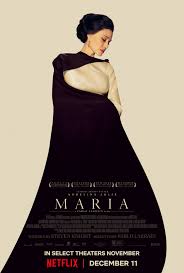
MARIA
Germany, 2024, 124 minutes, Colour.
Angelina Jolie, Pierfrancesco Favini, Alba Rohrwacher, Haluk Bilginer, Kodi Smit-McPhee, Stephen Ashfield, Valeria Golina, Caspar Phillipson.
Directed by Pablo Larrain.
It is almost 50 years since the death of famed opera singer, Maria Callas. She died in 1977, aged 53. Franco Zeffirelli made a film of the last week of her life, Callas Forever, with Fanny Ardant. Fanny Ardant collaborated with documentary filmmaker, Tom Volf’s documentary, 2017 documentary, Maria by Callas.
This is a film for both older audiences and younger audiences. It will offer older audiences the opportunity to remember, to listen again to the many arias throughout this film, the voice of Callas herself. The film will offer to those younger, who don’t remember her, a vivid portrait.
The film was written by English screenwriter, Steven Knight (Pretty Dirty Things, Peaky Blinders and many films and television series) but, importantly, was directed by the Chilean, Pablo Larrain, directors of significant political films but also two other biographies of significant 20th century women, Jackie (Jacqueline Kennedy Onassis) and Spencer (Princess Diana). Interestingly, there is the common denominator of Aristotle Onassis in Jackie and Maria.
And the choice of Angelina Jolie. She moves quite majestically through the film, often sweepingly, not only a prima donna, but one might say the sola donna, proud, sometimes arrogant in her interactions with people. The main focus is on the last week of her life, opening with her death, flashbacks of the previous week but, of course, flashbacks to past performances and achievements, and memories of her relationship with Onassis, and the insertion of an episode of meeting Jacqueline Kennedy at a party, present at the birthday where Marilyn Monroe sang (and some acid comments on her voice), and an icy encounter with JFK. (Callas in fact sang at this occasion.)
However, the main supporting characters here are her to devoted servants, her butler and her housemaid of many years, played by Italian stars, Pierfrancesco Favini and Alba Rohrwacher. We look at the ways she interacts with them, as she speaks to them, always superior, but a deep affection and sometimes dependence on them.
There is also the device of her wandering around Paris, stopping at various locations, flashbacks to performances, especially an orchestra playing in the rain, a scene from Madame Butterfly… And, during this wandering, there is a young filmmaker, Kodi Smit McPhee, called Mandrax, the drug that she was taking for support, her interactions with Mandrax, her conversations, his response, final hallucinations as she reviews her life.
This is a portrait of Maria Callas rather than a biography, an opportunity to listen again, to appreciate, to wonder at the complexities of personality for figures in the public eye.
- Audience knowledge of and admiration for Maria Callas, her voice, performance, career? What is knowledge of her life, mother, the war, criticisms of being fat, her emergence, her husband, the encounter with Aristotle Onassis, life with him, separating from him, her loss of her voice, her final years?
- The work of the director, his portrait of Jacqueline Kennedy, of Princess Diana, and the into cutting off the two women and their lives with Onassis?
- The framework of the film, the opening with Maria Callas’s death, her assistance standing around, the flashback of the seven days, the flashbacks within flashbacks, her performances, black-and-white photography, Angelina Jolie and her voice, the lip syncing with Maria Callas’s voice, the locations and her memories, her tablets, the filmmaker and her hallucinations, the conversations? The clash with her doctor? Of the theatre with the pianist, the technician in the spotlight, the journalist and his later confrontation?
- The importance of Ferrucio and Bruna? With Maria Callas for so many years, butler, housekeeper, with her in Paris, Bruna and the meals, the conversation, The ratio and the moving of the piano, concern about the doctor, that Maria Callas’ beck and call, her treatment of them, her dependence on them, their loyal service? The memories of being at her performances in the past? The concern in the present, her death?
- The film offering an overview of Maria Callas’ career, born in New York, her mother, the German soldiers, in Venice, the initial success, the visualising of the various concerts, the buildings in Paris, the performance in the rain with the orchestra, Madame Butterfly, her success, the decline? For testing her voice, but wanting to listen to her records? The final aria?
- Her personal relationships, the glimpse of her husband, at the party, the encounter with Onassis, his estimation of himself, rich and powerful, his infatuation with her, the invitation to the yacht, going with her husband, the beginning of the relationship, Onassis’ love for her, her moving away, not marrying, the issue of children, not wanting to be controlled? But her final visit to him?
- The contrivance of the scene at Kennedy’s birthday party, Marilyn Monroe’s happy birthday song, her comments of Marilyn Monror and the voice, the encounter with Jackie Kennedy, the yacht, the discussions with Kennedy himself, her estimation of himself and the relationships?
- The device of the film, the director and the name of the drug, Mandrax, the interviews, his responses, initially stolid, mellowing, the various scenes and interviews? The device, the hallucinations from her drugs? Herself revelations?
- The prima donna, the diva, her arrogance, treatment of people, the fan who had missed her performance and her treatment of him, the attack on the intrusive journalist, the conversation with the man at the bar and her music?
- The film as a portrait rather than a biography? Angelina Jolie’s performance? The sequences of actual Maria Callas during the final credits – more smiling and genial and throughout the film?
Moglie e Marito/Wife and Husband
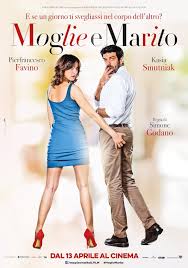
MOGLIE E MARITO/ WIFE AND HUSBAND
Italy, 2017, 95 minutes, Colour.
Pierfrancesco Favini, Kasia Smutniak, Valerio Aprea.
Directed by Simone Godano.
Vice versa comedies have been popular over the decades, mothers and daughters exchanging bodies, fathers and sons, older and younger, but, this time, it is husband and wife.
The style of the film is rather broad comedy, the establishing of the husband absorbed by his scientific investigations, investing all his inherited money in the experiments, working with a collaborator, going to make a device which will be able to record human memories. In the interested parties in exploiting the invention. On the other hand, the wives involved with a television station, the possibility of her becoming an interviewer.
Meanwhile, at home, the various tensions, he very much Owen’s expectations, she very disappointed, but the love for their son. Divorce proceedings.
The key episode is when the husband is experimenting, persuades his wife to sit and make a connection so that they can download each other’s memories. And, of course, this is the beginning of both comic and serious issues, and a lot of farcical comedy.
PF Francesco Fellini has become one of Italy’s top dramatic actors – and, he establishes his match our character and then has to go through the latter part of the film with his wife’s consciousness and her manner transferring to his body and bodily style. And, of course, the contrast with the wife becoming masculine in her manner. On the one hand, is easy for a male actor to become more simpering. On the other hand, there is the challenge for the actress match oh in her behaviour, sitting with legs spread apart, rough, awkward in shoes, even the issue of the monthly period.
Which means all kinds of complications, misunderstandings, the fiasco with interviews at the studio and angry interviewees – but popular with audiences. And, the awkwardness at the laboratory and the dangers of losing the invention. And, of course, the reactions of friends and employers to the strange behaviour.
A variation on the vice versa theme, a bit more unusual and the freaky Friday kinds of stories.
Comandante
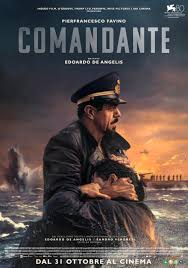
COMANDANTE
Italy, 2023, 121 minutes, Colour.
Perfrancisco Favini, Johan Heldenbergh, Massimiliano Rossi, Silvia D'Smico, Johannes Wirix.
Directed by Eduardo De Angelis.
We don’t see many films about Italian involvement in World War II, especially naval warfare, and, more especially, submarine warfare.
The story is based on actual characters and events, over a couple of weeks in the autumn of 1940. The focus, as the title indicates, is on the submarine, Comandante, Salvatore Todaro, a dedicated man, injured in a training accident and wearing a back brace, devoted to his pregnant wife, a tough but sympathetic commander of his men.
Ultimately, again as the title suggests, the focus of this drama is on the man himself rather than on the details of war although these are important and significant. For this reviewer, the film is the portrait of a humane man, in situations of war, challenge to act in a humane way. Sequences are context for his humanity. However, quite a number of critics and bloggers have complained that there is not enough action in the film, some even suggesting that the focus on the humanity, sentiment, breaks the film down.
For this reviewer, with the focus on the humanity, the portrait is very moving, especially at the end and the final information about the fate of the Comandante.
But, there is quite some action, especially as the submarine tries to get through the straits of Gibraltar, tangles in steel, self-sacrifice to cut the submarine free. There is camaraderie amongst the troops, especially with the Neapolitan cook and his specials and his singing.
The key drama is the submarine’s encounter with a Belgian cargo ship, allegedly neutral, carrying British arms. The Belgian crew are stranded, an appeal to the Comandante, his ethic of doing the right thing means that the Belgians come on board, crowded, two trying to sabotage the submarine, but a greater bonding between the Italians and the Belgians – especially with the offer to make a special Belgian dish and the answer is Fries, something the Italians are wary of, but ultimately enjoy.
The Comandante is played by veteran Italian actor, Pierre Francesco Favini, always convincing t inhe wide range of roles he performs.
There is a mention or two of Mussolini and the film offers a reminder of Italy in World War II but also a reminder of humanity and integrity in leadership.
- World War II story, Italian involvement, submarine warfare in the Atlantic?
- Based on a true story, Salvatore Todaro, in the Italian Navy, his personality, command of men, leadership in the submarine, decisions, strategies, his relationship with his wife, voice-over messages to her, her pregnancy? His humanity, treatment of prisoners of war? His subsequent history, reputation, premonitions of dying in his sleep, his death, the Belgian sailors visiting his wife and daughter after the war? The credits and thanks to his daughter?
- The atmosphere of the opening, his ejection into the sea, the drowning experience, rescue, rehabilitation, having to wear the brace, medical advice, the old man and his writing the quote in Greek (its later message and the Belgian translating it)? The scenes with his wife, her pregnancy?
- Taking command of the submarine, the marching of the men, his premonition about the sailor and the later operation, his relationship with the men, morale speeches to the men, Marcon and the experience sailor, friendship, advice? The younger members, his interactions with them, with the cook, the menus, the reward of the gnocchi, his singing the Neapolitan song?
- The visualising of the submarine, the exteriors and reconstruction, long tracking shot, the interiors, the cabin, the accommodation, the conning tower, the surface? In comparison with the merchant ship, the British ship?
- The management of the submarine, in war combat? Comparisons with the Germans? Mentions of Mussolini and fascists? Salvatore and his humanity?
- The strategies for passing through Gibraltar, going low, the dangers, reverberations? The tangling in the nets? The young sailor, volunteering, going out, the drama of severing the cables, his death, the requiem and the tributes?
- Out in the Atlantic, the encounter with the Belgian cargo ship, Belgian neutrality, carrying British arms? The attacks on the planes flying over? The attack on the ship? Destroying the ship, the men in the water, the boat?
- Rules of war, Salvatore and his decisions, Marcon and his opposition, the young Belgian coming on board, able to speak Italian, translate, the discussions? The prospects? The decision not to drown the sailors? Towing the boat? Taking them on board, the squashed accommodation, food, the humane sequence of the Belgian’s explaining how to make fries and the Italians amazed, eating them? The cook? The singing?
- The two rebels, pulling out the cables, the effect of the Belgians, Ion Salvatore, hitting them? Putting them in the conning tower? The dangers of flooding and death?
- The British ship, the appeal, the hesitation of the British captain, his deciding to let them go to safety?
- The progress of the submarine, to the Azores, safety?
- The final discussions with the Belgian captain, his gratitude, saying he would have all the men if the situation were reversed? The young Belgian, the story, his background, on the submarine, translations, friendship?
- The aftermath and the sailors visit to the wife and daughter?
- Some complaints that there was not enough action – but the film more of humanity?
Ultima Notte di Amore, L'/ Last Night of Amore
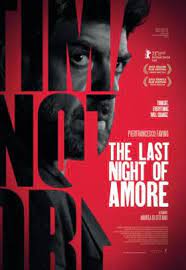
THE LAST NIGHT OF AMORE/ L’ULTIMA NOTTE DI AMORE
Italy, 2023, 124 minutes, Colour.
PierFrancesco Favini, Linda Caridi, Antonio Gerardi, Francesco Di Leva.
Directed by Andrea DiStefano.
A forceful strong police story.
The setting is Milan, seen during the initial credits, high above the buildings and night lights, a resounding score, setting up a mood. The focus then transfers to Franco Amore, 35 years and honourable police officer, his final night on duty, hurrying to an incident in a freeway tunnel, and the death of his partner. Quite a dramatic opening. But, was the title meant to be tantalising with its choice of Amore for Franco’s surname – it does sound like a title for a drama on sexuality and relationships, but no.
Then the action goes back 10 days, quite a complex story, a story of duty, a story of conscience and decisions.
For a long time, PierFrancesco Favini has been a significant leading man in Italian films. And this performance reinforces his status. He is composing his farewell speech for his colleagues, is in contact with his wife, loving him, but more than a touch flighty and ambitious. He is called by his wife’s cousin, a jewellery dealer, to help with a wealthy Chinese customer in a health crisis.
Franco has never shot anyone during his 35 years, has a solid reputation. However, financial difficulties are ever present, and officers take on side jobs out of hours. The first part of this drama is a job, Franco with his partner picking up some contacts from China at the airport, matters not quite right, a flat tire, police confrontation, shootings… All very dramatic, especially since the film does not use CGI but the sequences were filmed in an actual Milan tunnel, cars speeding past, danger, tension…
The second part of the film is the investigation, Franco confronting the mystery of what has happened, his attempts to find out the truth, betrayals, corruption, covering his own presence, his wife caring for the son of his dead partner, her flighty hopes and fantasies, her wilfulness intruding on the investigation.
While the complications of the action engrossing, it is the portrait of Franco, his hopes for his integrity, the financial situation concerning his pension as he finishes his service, discoveries of betrayal, and moral issues concerning the truth that are at the core. The film draws to a dignified ending, Franco confronting those who need to be confronted, but ending his career of duty with a message of appreciation to his colleagues. But, of course, the consequences are still open, the audience left to ponder what decisions they would make.
- The title? Franco Amor a and his police service, final night? The drama, challenged? The play on words on his surname?
- The Milan settings, the opening, the night, the aerial views of the city, prolonged, the dramatic music? The Cathedral, its recurring presence? Homes, police precincts, clubs, business centres, the streets, the freeways, the tunnel? The musical score?
- The initial atmosphere, Franco, the tunnel, the accident, the friend did, his reaction?
- Going back 10 days, the dramatic buildup to the situation, the complexities of the shooting, Franco leaving, alibi, returning, investigation, revelation of corruption, his final night, his broadcast to the police? His future?
- Franco as a character, 35 years in the police force, not fully promoted, never shooting, his reputation, interactions with his colleagues? The retirement, the pension, financial difficulties? Relationship with his wife, her personality, ambitions, pressure on him, hopes for the retirement? The moral issue of the job, the diamonds, her pressure? His friend, jobs out of hours, the decision to partner him at the airport? The consequences? His relationship with Cosimo, his wife’s cousin, call to help with the ailing Chinese? The consequences and working with the Chinese?
- The atmosphere of the police precinct, the officer in charge, attitude towards Franco, police investigations?
- Cosimo, the link with the Chinese, jewels and diamonds? Franco’s audience with the head, his son-in-law, sinister, ambitious? The old man’s gratitude? The job, the delivery of the diamonds, meeting at the airport, driving the carrier? The discussion with Dino, his son, Franco’s wife looking after him, Dino and his motivations?
- The situation, the airport, the carrier, the bodyguard, sinister and silent, no weapons? The drive, the tension, the flat tire, continuing to drive, stopping, the arrival of the police, the interrogations, the treatment? The gun, the shootings, Dino’s death, the bodyguard’s death? The carrier, escaping, with the diamonds, her being killed? Franco, taking the diamonds, throwing them onto the freeway? His leaving the situation?
- The tension, Franco’s alibi, going for the run, the Farewell party, his wife’s attitude, his phone call, getting her to collaborate, her pressure about taking the diamonds, driving to the scene, with Dino’s son, her demands, getting through, going to find the diamonds, the torch, her finding them? Getting away?
- The chief, the phone calls, summoning Franco, his arriving at the scene, his covering that he had not been there, Philip police, the phone, the suspicious calls, the suspicious officer and his reputation for corruption, the death of the police who attended the scene, the death of the woman, the presumption that there would be no shooting because of Franco’s reputation?
- The setup, the Chinese boss and his reaction, summoning the meeting, his son-in-law, Franco denouncing him, Franco and his statement that he would keep the diamonds, to support Dino’s son…?
- The final night, on the streets, the searching, the visit to the Chinese, on duty, the final broadcast and the acclaim from fellow officers?
- Franco standing, looking forward, his future?